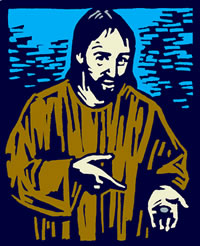
29th Sunday in Ordinary Time Year A
In these final weeks of the Church’s year, our readings from Matthew’s gospel point towards what lies ahead. Today’s gospel and that of next Sunday tell of the growing confrontation with the nation’s leaders that will lead to Jesus’ death. And in our last three readings from Matthew’s gospel Jesus warns his hearers that the end is approaching.
The exchange recorded in today’s gospel is well known. Matthew’s brief account tells us a great deal about the situation that was developing in the last days of Jesus life. The Jewish people bitterly resented the Roman occupation of their country; now, those who have turned against Jesus exploit this explosive situation to discredit him. The dilemma that Jesus is placed in by the question put to him about the paying of the Roman tax is brought out in Matthew’s account by the composition of the group putting the question – Pharisees and Herodians. The Pharisees represent Jews who have a real problem of conscience paying the tax. Strict Pharisees would have considered the inscription on the denarius handed to Jesus – which almost certainly read, ‘Tiberius Caesar, son of the divine Augustus, great high priest’ – to be blasphemous. This influential group, dedicated to upholding the traditions of God’s people, would have asked themselves whether they were compromising their principles by paying their tax with this coin. If Jesus encouraged the paying of the tax, he would not only offend the Pharisees, but also antagonise the common people who so resented the Roman rule. The Herodians, followers of Herod - the puppet ruler in league with the Romans - had no scruples concerning the tax. If Jesus condemned the paying of the tax, he could be denounced for subversion.
The famous reply of Jesus, ‘To Caesar what belongs to Caesar; and to God what belongs to God’ is not a clever evasion, as we may be led to think. With this reply, he turns the question back on his interrogators - taking the discussion beyond the level of the partisanship they are trying to exploit, he tells them that they are faced by a decision of conscience. As is so often the case – think of our own times – involvement in the political life of the nation is not a straightforward matter. The Romans had originally occupied Palestine at the invitation of Jewish leaders, bringing a relative stability, that replaced a situation of continuing anarchy. The contemporaries of Jesus must ask themselves whether the presence the Romans was the lesser of two evils. Today’s first reading from the later Isaian writings is well chosen. Cyrus – who ‘does not know’ the God of Israel – is called by the prophet, God’s ‘anointed’, as he fulfills God’s designs, sending the Jewish exiles back from captivity after his defeat of the Babylonians. God is Lord of all, certainly, Jesus is telling his listeners; but Jewish conscience must judge whether the Roman presence is providential, preventing a worse situation. We should note that Jesus invites the people to make their own judgment of conscience; he does not make it for them. We would misunderstand the reply of Jesus if we thought it was meant to instruct us about the relationship that should exist between Church and State. His reply concerns, not the order of politics, but the order of moral responsibility - the individual’s duty to participate in the life of the nation in a way that best promotes the common good of justice and peace. At a later date, when the Roman state became a demonic force intent on destroying the Church, defiance of the authorities was called for, and produced the martyrs who were the glory of the early Church.
John Thornhill sm

